Interview with Zehra Patwa of the Connecticut Coalition to End FGM/C
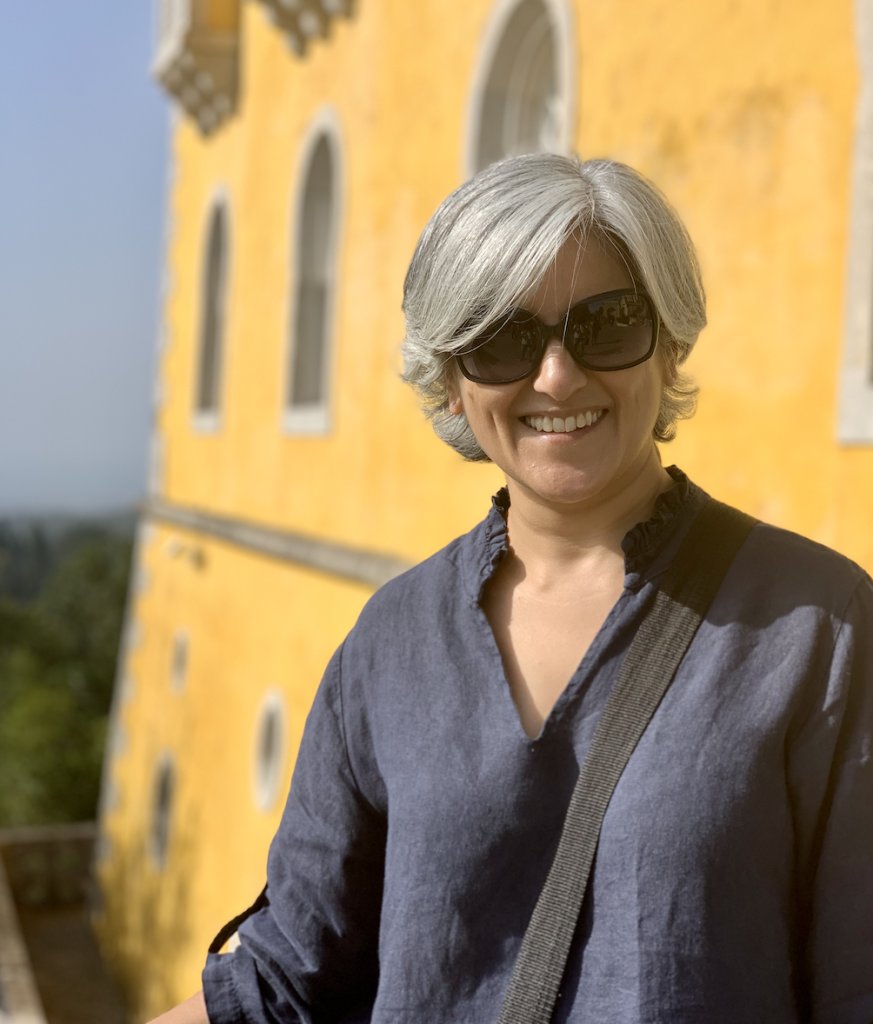
Recently, policy interns at Sahiyo have been interviewing members of the Connecticut (CT) Coalition to End FGM/C to learn more about its members and all the important work they contribute toward ending female genital mutilation/cutting (FGM/C). For the first two blogs, we interviewed Caitlin LeMay and Joanne Golden. In our third blog, Sahiyo’s policy intern, Juliet Shires, spoke to Zehra Patwa, Sahiyo U.S.’s Advisory Board Chair and co-founder of WeSpeakOut. When she was in her 40s, Patwa discovered that FGM/C was taking place in the Dawoodi Bohra community she belongs to. “I was shown an interview that my cousin had done for a TV documentary in Australia, talking about her experience of FGM/C in the Bohra community […] I thought ‘Oh, that’s terrible that she had to go through this.’ And at the end of the interview, she said that all the girls in her community had been cut and I could not even fathom that. The women [in my community] have always been highly intelligent, and progressive role models…so to hear that women in the community were doing this practice on young girls just blew me away. It took me a while to even accept that it was happening.” Then came another shock: Patwa learned that she had undergone FGM/C when she was just seven years old, but had no recollection of the event. She decided that she needed to do something to end the practice of FGM/C in her community and beyond. Her cousin invited her to join a WhatsApp group chat where she met the Sahiyo co-founders and Masooma Ranalvi, who would later co-found WeSpeakOut with Patwa. “I had to do something with this anger, with this shock, with all of these things I was feeling, and this lack of clarity that I had of what happened to me…I could not bear the thought that this was still happening to other girls. Part of the awfulness of this practice, for me, is that you don’t even give girls and women a chance, by cutting them…you risk so much pain, so much trauma.” A large part of her advocacy relates to her work with her own organization, WeSpeakOut, a partner of the CT Coalition and Sahiyo. WeSpeakOut is primarily focused on making FGM/C illegal in India, though it also works on other issues that impact women in the Bohra community. Their work involves research studies, petitions, and creating a legal framework for legislation banning the practice: “Because India is the seat of the Bohra community — that’s where the religious head is based — we figured if [FGM/C] was made illegal in India, then the Bohra diaspora all over the world would agree that the practice is illegal and would discontinue it. Sadly, passing a law in India involves many hurdles but we are seeing glimmers of social change in the community just by talking about this issue.” Patwa explains that speaking out has led to many conversations, many of which have highlighted how important education is in making meaningful changes against FGC: “When I started my activism in 2015, and started speaking out publicly in 2016 — which was terribly nerve-racking — so many people said to me, ‘Oh, I had no idea this happened here.’ I think people don’t realize how widespread this practice is. People want to know how many women and girls are cut…well, there’s no way of really knowing for sure, but it’s been estimated that there are more than 2,500 girls at risk in Connecticut alone, but the number is potentially much higher because it is such a clandestine practice. The states surrounding Connecticut have anti-FGM/C laws but Connecticut doesn’t, which makes our state a destination for cutting. [People I talk to often express surprise that] it’s a cultural practice, not a religious one.” She also emphasized the importance of empathy and understanding when creating legislation and advocating against the practice: “The parents who take their girls to be cut are not monsters…they’re being pressured into doing it because they’re told it’s the right thing to do by the trusted elders in their community. With education and the support of the law, parents can make an informed decision, backed by facts and others’ experiences, to protect their daughters.” Patwa expressed disappointment that a law has still not been passed in Connecticut, but remains hopeful: “It’s been disappointing that our bill has not made it into session three years in a row…it was a little disheartening at first but we are determined to continue working to pass this law because, even though we may not have huge numbers of girls at risk, we have some. And as far as I’m concerned, one girl cut is one too many. I know how much Connecticut cares about people and tries to do the right thing. I know in my heart that this law will be passed because it’s absolutely the right thing to do.” For people who would like to get involved in FGM/C activism, Patwa’s advice is simple: “Educate yourself, talk to people, reach out to people. Anybody at the Connecticut Coalition and at Sahiyo is very willing to help… And any organization that wants to become part of the coalition is welcome to lend their support: the more broad the coalition, the more helpful it will be to pass this law.” Patwa’s own experience with the Connecticut Coalition and the support it has received has strengthened her belief that FGM/C can end. “I truly appreciate all the allies who work to help survivors and prevent this practice. The Connecticut Coalition is now huge — there are many organizations involved. It’s heartening to have so many allies, who may not be from FGC-practicing communities, but who understand that there are so many different ways that they can help. It makes me tear up thinking about how much people care about others with different experiences from themselves. It gives me hope that we will see the end of this practice in my lifetime.” We would like to thank Zehra
Male Engagement within the Movement to End FGM/C: From Conversation to Connection: Creating a dialogue between men and women on FGM/C

By: Bakahn Jamal Talking about FGC with others is not always easy, especially when speaking to men about the subject. Over the month of June, Sahiyo held an awareness campaign in honor of Fathers day, highlighting the importance of engaging in conversations with men about FGC. In connection with that campaign, Sahiyo reached out to Bakahn Jamal, a Project Supervisor for Wadi, an organization promoting self-help programs in the Middle East. A large part of her work is going to rural communities and creating dialogues with local leaders about the dangers of FGC. Below, Bakahn shared her experiences and advice for engaging in conversations with men about FGC, and why those conversations are critical to the movement to end FGC. 1. How did you start initiating dialogue with men about FGM/C? When working with women regarding the topic of FGM and [its consequences] – such as intimacy and sexual issues – women will tell us that we should also speak with their husbands about the implications of FGM because “he does not understand why I might act or feel in certain ways.” Through these conversations, we realized the importance of involving men in a dialogue about these issues. That is how we started working with men — by asking them what their knowledge of FGM was and also asking them how they felt about the practice. From there, we were able to ask them to help advocate to end the practice in their own communities. 2. What has been your experience engaging with men about the practice in their communities? The subject of FGM with men is always tricky because one will not know what to expect. Traditionally, FGM is considered “woman’s territory,” meaning men will avoid talking or associating themselves with such conversations about the practice. Most men will immediately shut down such conversations, and some will even get embarrassed or aggressive, but one thing for sure is that they have little to no knowledge about the practice itself. This is why including education within our advocacy work with men is so important because it leads to more productive conversations. 3. Has this experience been positive or negative? I get both positive and negative reactions. Some men get really upset and shame us for talking about such “embarrassing and shameful” topics. However, there are also men who welcome the topic and tell us that they have many issues within their marriage related to FGC. We also had men who we’ve worked with start advocating for ending the practice in their communities once they fully understood the negative effects FGM has on women and girls. One very good example of this is a man who we worked with called Kak Sarhad. He was a mayor in a village by the name of Tutaqal. His leadership and willingness to speak on the practice was one of the reasons the village became FGM-free. He helped [save] many girls from being cut in his community. 4. Has speaking to men about FGM/C changed the way you approach your work to end FGM/C and if so, how? I’ve realized that men can be a very big help in ending the practice. There are many influential male figures in our society who can make a huge positive change in our communities, from clerics to mayors, to tribal leaders or even the head of family. When men understand that FGM endangers their daughters, wives, and close female relatives and friends, they start to understand how their indifference toward the practice only makes the matter worse. We especially try to engage with fathers on the topic because they are often the decision-makers in a household in our society. So, if they say “my daughters are not to be mutilated,” I doubt that anyone in the family would go against that. If you have the support of a well-respected male figure no one will question your motive, even when you are advocating for ending a very deep-rooted tradition. 5. What message would you like to give men about the importance of ending FGC? What I want to say to every male figure regarding FGM is that FGM is not only a female issue — this practice also impacts men and the well-being and future of their families. FGM can be very destructive. Without men realizing it, it can impact very small details of their lives and it can also become deadly to their loved ones. So please educate yourself and know ignorance might cost your daughter, your sister, or your wife the future they deserve. Related: Breaking the Silence: A Conversation with My Father About FGM/C The practice of khatna on girls must stop / છોકરીઓ પર ખત્નાની પ્રથા બંધ થવી જોઈએ Starting the Dialogue: Sharing Your Experiences on Initiating Conversations with Men about Female Genital Cutting Ending FGM – Fight the Mansplaining, Toxic Masculinity, and Patriarchy
Reflecting on The 4 Essential Strategies for Self and Community Care in Activism Event with Farzana Doctor

By Rachel Wine Held on September 10, and co-hosted by Sahiyo and The U.S. End FGM/C Network, Farzana Doctor introduced her new workbook: “52 Weeks To A Sweeter Life”. The workbook is dedicated to the caregiver type and provides strategies for self-care and tapping into care via community, both of which are often overlooked in the sphere of activism. Farzana began by sharing her experiences with burnout and vicarious trauma, as well as her personal journey toward self-care as an activist. As she relays in the book, her experience is unique but also ties into the greater experience of grind culture and deprioritization of individual and collective well-being. To combat these challenges, Farzana explores what self-care and community care look like, how they are linked, and highlights the four strategies for well-being she deems essential: [Know] burnout is structurally rooted Understand the links between self- and community-care Normalize burnout and compassion fatigue as human experiences that require our gentle attention Let your nervous system be your guide As an activist, and someone that struggles to take time for myself, I am grateful for the accessible and open-hearted guide Farzana has created. You can buy a copy of Farzana’s workbook here. The event ended with a testimony from Severina Lemachokoti, an anti-FGC activist, human rights defender, and gender activist from the Samburu community in Northern Kenya. Severina’s experiences with the challenges of balancing activism and her personal life provided a successful backdrop for the need of the FGM/C Policy Advocate Care Fund. Recognizing the need to support activists who often provided labor and advocacy to further social justice issues at the expense of their well-being, the U.S. Network in partnership with Sahiyo U.S. launched the FGM/C Policy Advocate Care Fund. The fund’s goal is to ensure advocates are fairly compensated and honored for their invaluable contributions, addressing the gaps in funding and acknowledgment they too often face.
Introducing The FGM/C Policy Advocate Care Fund
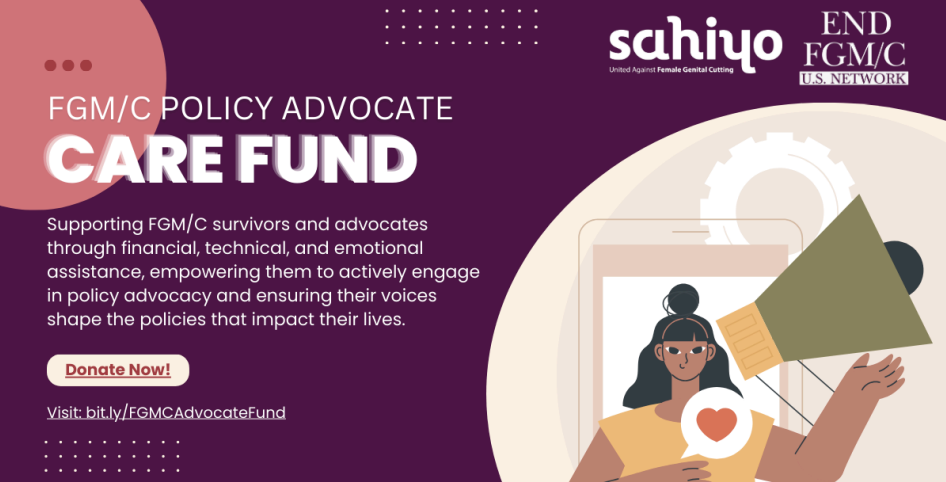
The newly established FGM/C Policy Advocate Care Fund provides vital resources and support to those tirelessly working to prevent FGM/C and support survivors. Created through a partnership between Sahiyo U.S. and the U.S. End FGM/C Network, this fund aims to: Empower survivors and individuals from communities impacted by FGM/C Enable survivors, activists, and advocates to actively engage in education and policy advocacy Ensure that activists are fairly compensated for their contributions, recognizing that they are often overlooked and underfunded. Advocates working to end FGM/C face numerous challenges including resistance from communities, lack of resources, and risks to their health and mental well being. Finding ways to support these advocates can help ensure individuals can continue their vital work to end FGM/C, effectively and safely. The goal of the fund is to empower activists, advocates, and survivors to create meaningful change in their communities and end this harmful practice. Your donation is essential in sustaining the critical work of advocates dedicated to ending FGM/C. By donating to The FGM/C Policy Advocate Care Fund, you’re directly empowering advocates, ensuring they have the financial, technical, and emotional support necessary to continue their impactful work. Your contribution strengthens their capacity, safeguards their well-being, and creates lasting change in the world. Donate Here. (P.S. don’t miss out on our upcoming event, “4 Essential Strategies for Self and Community Care in Activism,” with Farzana Doctor, on Tuesday, September 10th at 9:00 AM PST/ 12:00 PM EST. Register Here.)
“Four Essential Strategies for Self and Community Care in Activism” Event with Farzana Doctor on September 10th
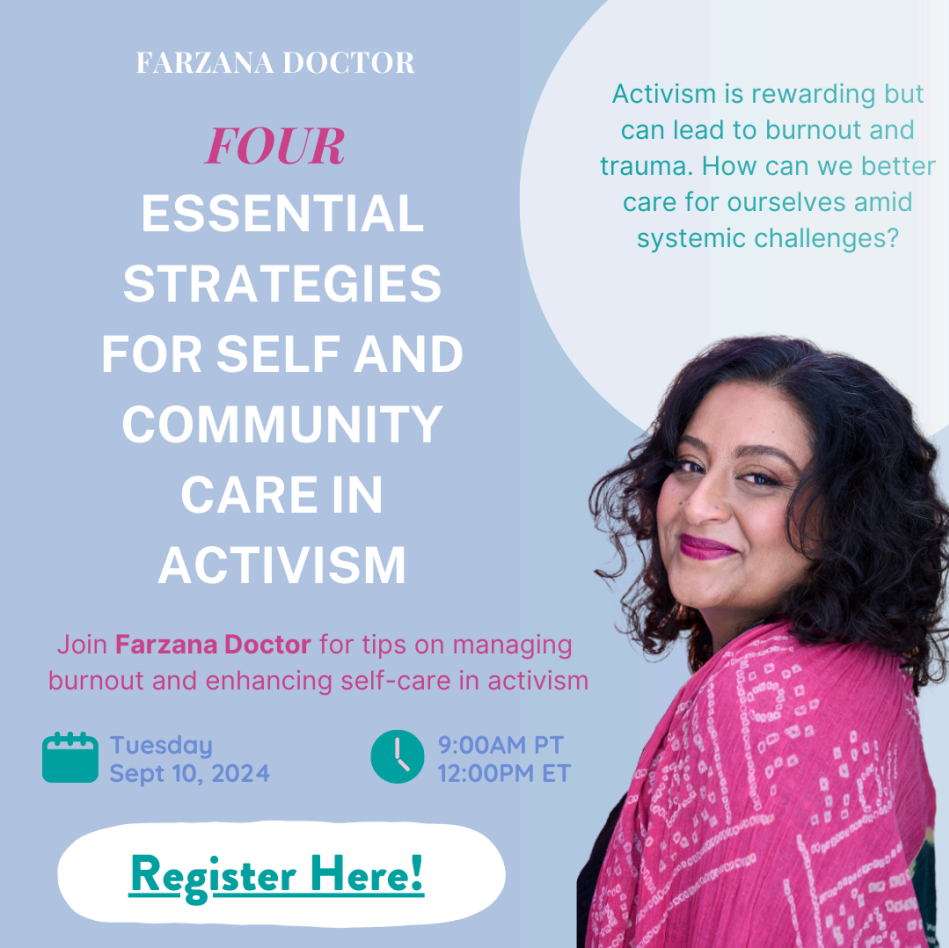
Sahiyo U.S. and the U.S.End FGM/C Network invite you to join our upcoming event, “4 Essential Strategies for Self and Community Care in Activism.” This event is free to attend, but we invite you to make a meaningful contribution to support the FGM/C Policy Advocate Care Fund today. Date: Tuesday, September 10, 2024 Time: 9-10 am PT / 12-1 pm ET Platform: Virtual – Zoom Registration Link: bit.ly/CareForActivists Description: Farzana Doctor, an activist, social worker, Sahiyo blog contributor, and author, will share practical strategies to help reduce stress, fatigue, and vicarious trauma, offering actionable ideas to bring more self and community care into the lives and work of those working for social change. While activism is incredibly rewarding, it can also be demanding and overwhelming. The dedication to addressing global injustices can often lead to burnout, vicarious trauma, and self-doubt. Many of these problems arise due to systemic issues, such as underfunding in the activism sector, oppression, and ongoing global crises. This event aims to equip individuals with tools to prioritize their well-being while doing the invaluable work of supporting and protecting people and communities. Don’t miss this important opportunity to learn and engage in a conversation about sustaining activism while maintaining your well-being. About the FGM/C Policy Advocate Care Fund: We’re excited to announce this event is being held to also support the newly established FGM/C Policy Advocate Care Fund, a joint initiative by Sahiyo U.S. and the U.S. End FGM/C Network. This fund is dedicated to empowering advocates and survivors who work relentlessly to address FGM/C in their communities to gain the resources and support they need to actively engage in education and policy advocacy. Our goal is to ensure these advocates are fairly compensated and honored for their invaluable contributions, addressing the gaps in funding and acknowledgment they too often face. Support FGM/C Policy Advocates! Donate today!
Reflecting on our webinar: Quiet Activism and Understanding the Psychosocial Impacts of Female Genital Cutting

On April 25th, our Sahiyo community came together for a deeply engaging webinar, joined by participants from across the globe including the United Arab Emirates, Nepal, Switzerland, Myanmar, and India. The event, titled “Quiet Activism and Understanding the Psychosocial Impacts of Female Genital Cutting,” brought together a panel of inspiring speakers: Arefa Cassoobhoy, Farrah Dalal, Doris Mukangu, and Lubaina Plumber. Each shared their personal stories of activism and reflected on how their work has evolved during different stages of their lives. Our speakers opened up about their unique journeys, discussing the “quiet” or private forms of activism that shape their day-to-day lives. They discussed navigating complex psychosocial contexts—ranging from family dynamics to community backlash—and shared valuable insights on the feeling of burnout and fatigue as well as the importance of fostering allyship while prioritizing mental health and wellbeing. We encourage you to watch the full webinar to hear more about their experiences with initiating sensitive conversations within tight-knit communities and leveraging personal stories to foster understanding and empathy. The warmth and engagement from our audience were palpable, with many expressing their eagerness to dive deeper into the topics of quiet activism and the sense of solidarity, resonating deeply with the speakers. One attendee captured the sentiment beautifully, saying, “I am in awe of you young ladies. I applaud you all for the steps you have taken and how you have dealt with your experiences. Keep up your great work and what you are doing. My heart is with you.” This event reminds us of the power of community and the impact of every thoughtful action in our shared cause.
Pathways to Progress: Community Engagement in Ending Female Genital Cutting
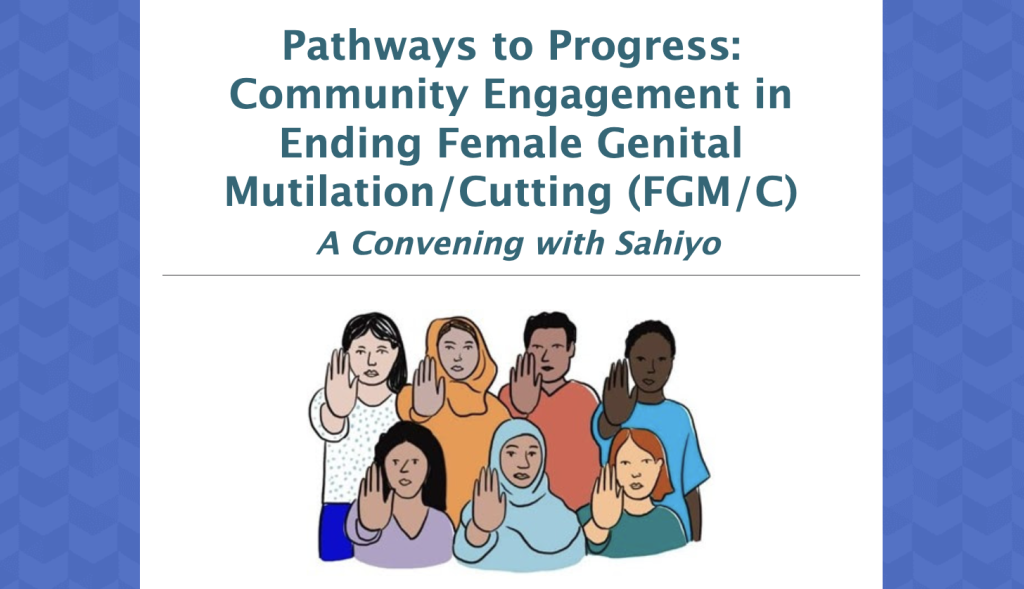
Date: March 18, 2024 Time: 9AM-10:30AM Pacific/ 12PM-1:30PM Eastern Register here: https://bit.ly/RTIxSahiyo. On March 18, Sahiyo and other FGM/C advocates will discuss the pivotal role community engagement plays in raising awareness of FGM/C and ultimately ending the practice. Led by Sahiyo’s U.S. Executive Director Mariya Taher, panelists will share effective ways to engage with FGM/C impacted communities. We invite everybody to attend the virtual panel discussion! Speakers will include: Wonder Guannu, who is the African Cultural Alliance of North America’s Project Coordinator for the FGM/C Project in Philadelphia Samman Masud, who is Sahiyo’s Community Engagement Coordinator Breanne Lash, who is the Director of Programs for Nile Sisters Development Initiative in Los Angeles and San Diego Who should attend this virtual event? Anybody who wants to increase engagement with individuals and communities impacted by FGM/C. What will the event be about? Panelists will share diverse case studies, illustrating real-world examples of community engagement in this field. These discussions will dive into the intricacies of building partnerships, mobilizing resources, influencing systems, and sustaining community and individual-level involvement to improve the wellbeing of those affected by FGM/C. Attendees will: Gain valuable insights into the challenges and successes of initiatives to address FGM/C Learn and be inspired by the power of community engagement in creating impact Gain knowledge about specific strategies Have the opportunity to discuss any workshop approaches that they have used in their communities Register for the event here: https://bit.ly/RTIxSahiyo. After registering, you will receive a confirmation email containing information about joining the meeting. PS: Sahiyo’s Silent Auction fundraising event kicks off on March 6-10 while the Live Virtual Comedy Show will take place on March 7. We aim to raise $15,000 in support of our work. Click here to donate auction items, money, or sponsor the event.
Activist Saza Faradilla and End FGC Singapore spread awareness about FGC
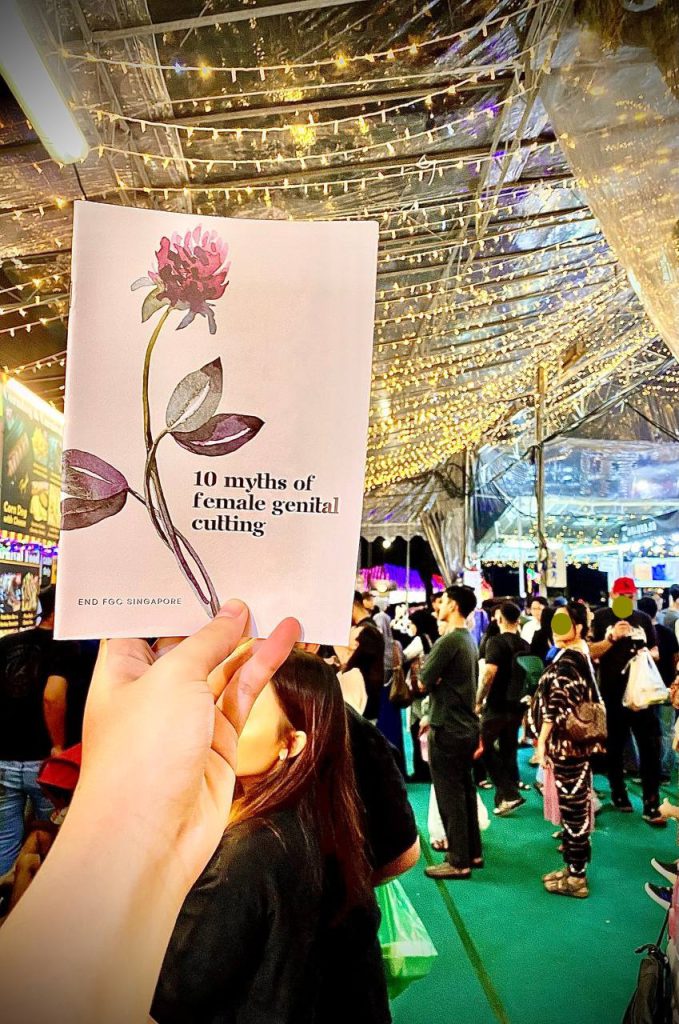
By Megan Seaver An essential part of the work to end female genital cutting (FGC) is to engage in community-based activism, which means to serve a specific group of people with a specific set of needs and values. Sahiyo’s Editorial Assistant Urvashi Sharma interviewed Saza Faradilla, a community-based activist in Singapore, to discuss how she engages in community-based activism when it comes to the campaign to end FGC. Saza began the conversation with an explanation for her centralized, community-based approach to ending FGC in Singapore: “We started End FGC Singapore in November 2020, primarily because we believed that a cohesive, more ordered force needed to be established to bring an end to this practice.” From there, the first step was to “raise awareness among the Muslim community,” then “to lobby officials who occupy high positions of power,” and finally “to facilitate solidarity among Singaporeans in order to create an understanding that this…is a Singapore health problem.” End FGC Singapore uses educational methods to challenge stereotypes surrounding FGC, including discussing how FGC should not be interpreted as a religious mandate for Muslim women. As part of their programs last year, End FGC Singapore decided that during the holy month of Ramadan, they would bring awareness to FGC through hosting a public awareness campaign. “This isn’t the first time we’re doing this – last year we distributed our booklets outside the mosque, but decided to take it to the next level this year in order to reach out to the people we’re trying to influence.” The bazaar is set up during Ramdan which consists of food, vendors, and activities for families. Saza reflected on choosing the Bazaar, explaining that it was the event to pass out educational booklets on FGC because “the Bazaar is younger, attracts a larger crowd, and is more hip. It’s important for effective activism to be able to segment our audience and then provide targeted marketing. Those are the people whose minds we are trying to broaden and influence.” End FGC Singapore sought to speak with the younger generation of Muslims in Singapore because they felt that a younger audience would be more receptive and open minded to criticizing the practice of FGC; focusing on younger Singaporeans also gives End FGC Singapore the opportunity to create generational change. These young people will one day hold positions of power in their communities, and because they have been exposed to End FGC Singapore’s activism, there is a greater chance they may put forward laws and ideas that help end FGC. Saza also explored different people reactions when being handed the booklet: “Common questions that we receive are along the lines of, is this practice required in Islam, is this practice safe if it’s done by a doctor, is sunat perempuan the same as FGM, etc. So we addressed the issue from a health perspective, a religious perspective, and then a cultural perspective.” End FGC Singapore have set themselves up to provide future activist programs because they have established a common connection within their community. End FGC Singapore also made sure that the information in the booklet was educational, while still appealing to inclusion of the Muslim community. But in distributing the booklet at the Bazaar, they did run into some challenges. “Most people are quite shocked at first because they don’t expect to talk about FGC in a Bazaar.” Saza’s work has also gained media attention, as the booklet program was featured in an article published by Mediacorp Today. However, not all the feedback has been positive: “The Ramadan Bazaar organizers reached out to us after the article came out and messaged me saying that I’m not supposed to do this because I didn’t get approval (in Singapore you need to get approval for everything). However, it is legal to give out any non-political booklets in all public spaces. So we had a meeting with them arguing that the Ramadan Bazaar is a public space.” Despite the pushback, End FGC Singapore’s use of a public space to deliver the booklets is a testament of their commitment to community-based activism. Saza and her team know their community and have tailored their community engagement work towards the youth, who they hope will understand the harms of FGC and work towards prevention of it for future generations. This community-centered approach creates space for dialogue between communities and activist organizations, which is vital to ending the practice of FGC.
Washington State makes progress to end FGM/C
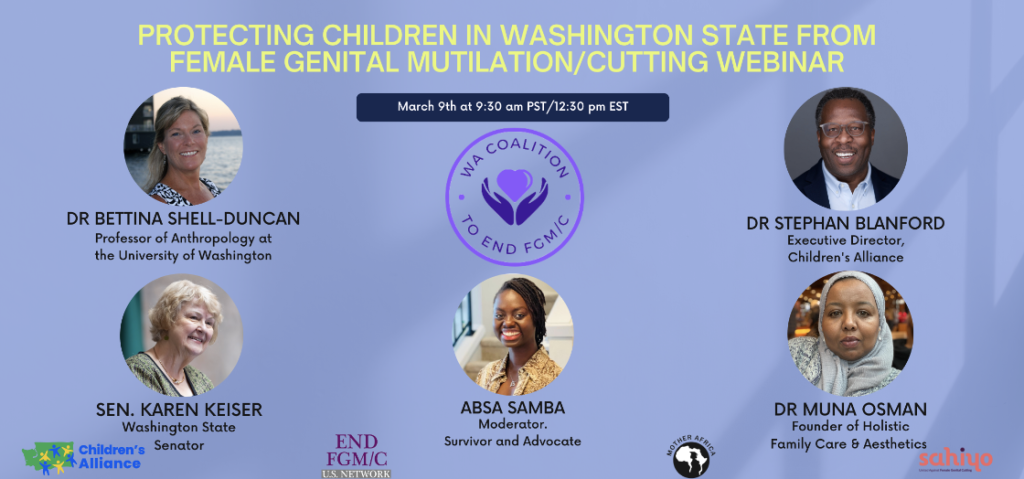
Washington State is one of the remaining ten U.S. states without any law that addresses and prohibits female genial mutilation/cutting (FGM/C). FGM/C is a human rights violation and form of child abuse and gender-based violence that involves removal of the female genitalia for non-medical purposes. This gap in state protection has left children in Washington vulnerable to this harmful practice. In fact, an estimated 25,000 women and girls in Washington are living with or at risk of undergoing FGM/C. The Seattle-Tacoma-Bellevue metro area is considered the 5th highest metro area in the U.S. in terms of the size of the FGM/C-affected community. In 2019, a change.org petition that gained 170,000+ signatures was started to address this lack of protection for children. “Washington state is #18 for gender equality by US News and World Report. Gender Equality should be a priority in Washington state. Social, political, and economic equality and equity is limited when we don’t have the full participation of all of our women and girls. Harmful customs or social norms that contribute to GBV (gender-based violence) including FGM/C in addition to costing lifelong pain and suffering can hold women, girls, and others who have undergone FGM/C back from full participation.” ~ Absa Samba The Washington Coalition to End FGM/C was created to educate people in the state about the need for policy solutions to address FGM/C. The coalition is made up of survivors, community organizations, legislators, advocates, and others. On March 9th the Washington Coalition to End FGM/C held a webinar in partnership with Sahiyo, The U.S. End FGM/C Network, Children’s Alliance, and Mother Africa to help shed light on how FGM/C impacts those living in Washington state, and to discuss policy level solutions, community-based programs, and education initiatives needed to protect women, girls, and others from undergoing this harmful practice. Speakers included: Absa Samba, a student, activist, and survivor of FGM/C who helped found the Coalition and made contact with Washington Senators to sponsor a bill against FGM/C, Bettina Shell Duncan, a Professor of Anthropology at the University of Washington in Seattle who has done extensive research on FGM/C, Stephan Blanford, the Executive Director of Children’s Alliance, Muna Osman, Doctorate Prepared Nurse Practitioner, founder of holistic family care clinic, a co-founder of mama amaan research team, and survivor, Senator Karen Keiser (D-WA 33), sponsor of SB 5453, a bill that will make FGM/C illegal in Washington State. Speakers helped to shed light on the issue of FGM/C by discussing what it was, who it impacts, and most importantly, that it does affect residents of Washington. The vital need for policy to end FGM/C amongst future generations of children was also discussed. “The pressure to undergo FGM can be intense for girls and their families…the solution is to coordinate change in families and communities so that people are not acting in isolation. If everybody can agree to abandon the practice, the negative sanctions can be lifted…When other members of the community are given the power of law to strengthen their position, the law becomes a powerful tool for enhancing their power to persuade others that this is a practice that’s no longer relevant in this context and in this time.” ~ Bettina Shell Duncan, panelist The coalition has supported policy work by working on the passage of Washington Senate Bill 5453. This bill, informed by the Washington Coalition to End FGM/C, has been championed by state Senator Karen Keiser and, if passed, will prohibit FGM/C on minors, creates a civil cause of action for survivors of FGM/C, and establishes an education program to prevent FGM/C in Washington. “This education component of this bill is huge for our [Somali] community. I think this bill coming from us, for us, by us, to help the community, I think it is a beautiful thing. I am confident that the community will accept it.” ~ Muna Osman, panelist During the event, audience members were also called to action to support the bill by signing onto an action alert. As of March 29, Senate Bill 5453 has passed the Washington state Senate unanimously and is making its way through the House of Representatives. Similar legislation was introduced in the Washington legislature in 2019 but it did not pass; a key difference between the two campaigns is that this year in 2023, the bill is backed by a strong coalition of directly-impacted survivors, advocates, community members, health practitioners, human rights activists, policymakers, faith based groups, and other allies. Whereas in 2019, there was a lack of inclusion of FGC impacted communities who lived in Washington in the crafting of the legislation. The unanimous support from legislators this year is a strong indication that Washington state will become the 41st state to pass a law to prohibit and prevent FGM/C.
Washington Coalition hosts educational webinar on female genital cutting

On March 9th, the Washington Coalition to End FGM/C, in partnership with Sahiyo, The U.S. End FGM/C Network, Children’s Alliance, and Mother Africa, held a webinar called Protecting Children in Washington State from Female Genital Mutilation/Cutting with the goal of drawing attention to this human rights violation and how it impacts children in the State. The webinar was also held to highlight the need for Senate Bill 5453, which would make female genital cutting (FGC) illegal in the state, provide civil remedies for survivors, and call on education programs on FGC to be created. A 2016 study by the Population Reference Bureau estimated that 25,000 girls and women in Washington State are living with or at risk of undergoing FGC. The study also ranked the Seattle-Tacoma-Bellevue metro area as the 5th highest metro area in terms of size of the FGC-affected community in the U.S. The webinar hosted a panel discussion in which speakers Absa Samba and Muna Osman shared their personal experiences with FGC as survivors and activists working to end the practice. Researcher Bettina Shell-Duncan discussed how research supports the need for legislation to change social norms around communities believing that FGC had to continue for the good of the child. Finally, Stephan Blanford, Executive Director of the Children’s Alliance highlighted how the state has seen other sharmful ocial norms regarding children change through policy in the state and how he is confident the same could be said if a law on FGC were created. Watch the recording of the webinar here: [youtube url=”https://www.youtube.com/watch?v=pZEefGBUTzQ”]
